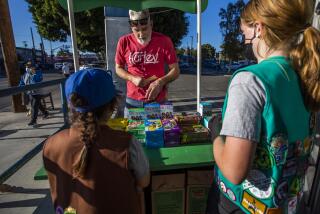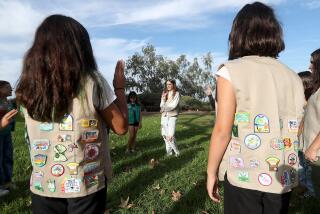Brownies Learn Girls Can Do It All
- Share via
HARTFORD, Conn. — Renee Harper, 8, likes boys all right, but basically, they are pests.
It’s not that they tease or bother her. They’re just . . . there. You know. Girls are better, she says.
When she grows up, she wants to be a lawyer.
“I think girls can be better ones,” she says, ducking her head and smiling.
When Magna Harper, Renee’s mother, was a girl in Barbados, she was taught, as a Girl Guide, that she could grow up to be anything.
Then she immigrated to Hartford, only to be surprised that the land of opportunity didn’t reach the same horizons as her island home.
“It was so astounding to come here and find out kids have strange ideas about being anything,” Harper says.
Now Harper, leader of Brownie Troop No. 93, which meets in north Hartford, is involved in a pilot program designed to build the self-esteem of girls ages 6 to 8.
The program’s title is “Partners Not Pests.” Related programs designed for girls slightly older are “Partners Not Pawns,” and “Lifestyles,” which includes workshops for girls and their parents.
The titles are based on the social development of the girls and boys. Usually, boys treat young girls as people to be tolerated--pests. As the girls get older, boys treat them more as they think older boys do--as pawns. The oldest girls are given lessons on making choices in their lifestyles.
“We are trying to build self-esteem,” Harper says. “We try to make them feel they can be anything. They say, ‘Oh, only boys can do that.’ They still have these ideas.”
Being a girl is confusing, especially when the boys seem to get all the attention. Despite what look like gains from the women’s movement, many girls still think of themselves as secondary citizens.
The three-year program is funded by a $197,461 grant from the Hartford Foundation for Public Giving; it should reach 4,500 girls in troops in the Hartford area.
Susan R. Campbell, foundation program officer, says the grant was awarded because the program’s lessons are important.
“This seemed like a proposal that had the potential to make a difference,” Campbell says. “It’s really targeting primarily younger kids, and all the information you read about teen pregnancy indicates that the sooner you can get to these kids with sex education and family-life education, the more impact it may have on them in their lives.”
The program stems from a Connecticut Valley Girl Scout Council board directive to address teen-age pregnancy and substance abuse in the Hartford area, said Joan Hall, the council’s assistant executive director.
“We have tried to be really on the cutting edge,” Hall says. “In reality, we are talking about the development of healthy male-female relationships. Sex is only a part of that.”
In addressing the topics of self-esteem and healthy relationships as a foundation for later sexual relationships, the Girl Scouts are joining the Boy Scouts on the cutting edge. The Boy Scouts of America recently revamped its handbook to include discussions of sexual abuse, unwanted pregnancies and sexually transmitted diseases.
More to Read
Sign up for Essential California
The most important California stories and recommendations in your inbox every morning.
You may occasionally receive promotional content from the Los Angeles Times.













